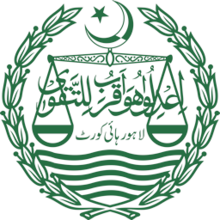Related Research Articles

The Supreme Court of Pakistan is the apex court in the judicial hierarchy of the Islamic Republic of Pakistan.

The Lahore High Court is a provincial court house based in Lahore,Punjab,Pakistan. It was established as a high court on 21 March 1882. The Lahore High Court has jurisdiction over the province of Punjab. The High Court's principal seat is in Lahore,but there are benches in three other cities of the province:Rawalpindi,Multan and Bahawalpur.

Sir Mian Abdul Rashid,KCSI,H.Pk was the first Chief Justice of Pakistan,legal philosopher,one of the founding fathers of Pakistan,and a jurist.

The Federal Shariat Court (FSC) is a constitutional islamic religious court of the Islamic Republic of Pakistan,which has the power to examine and determine whether the laws of the country comply with Sharia law. The court was established in 1980 during the government of the President General Muhammad Zia-ul-Haq. It is located in the federal capital,Islamabad. It hears appeals under the Hudood Ordinances,a religious legislation in the country introduced in 1979.

The chief justice of the Federal Shariat Court of Pakistan heads the Federal Shariat Court of Pakistan. The chief justice of the Shariat Court is the second-highest judicial office in the country,after the chief justice of Pakistan.

Nasir Aslam Zahid;Barrister-at-Law,is a Pakistani judge who served as the Chief Justice of the Sindh High Court and then a judge of the Federal Shariat Court of Pakistan and Supreme Court of Pakistan.

Justice Irshad Hasan Khan is a Pakistani jurist who served as Chief Justice of Pakistan from January 2000 to January 2002.

The High Court of Sindh is the highest judicial institution of the Pakistani province of Sindh. Established in 1906,the Court situated in the provincial capital at Karachi. Apart from being the highest Court of Appeal for Sindh in civil and criminal matters,the Court was the District Court and the Court of Session in Karachi.

Sayed Zahid Hussain is a former judge of the Supreme Court of Pakistan and a former chief justice of the Lahore High Court,who also held the position of being the Chairman of The Federal Service Tribunal,and until recently served as the law consultant to the President of Pakistan to hear the appeals against order of Federal Obudsman.

Falak Sher is a former justice of Supreme Court of Pakistan and a former Chief Justice of Lahore High Court.

Mian Saqib Nisar is a Pakistani jurist who served as the 25th Chief Justice of Pakistan from 31 December 2016 till 17 January 2019. He has previously served as the Law Secretary. He also served as a visiting professor of law at the University of the Punjab,where he provided instructions on constitutional law.
Umar Ata Bandial is a Pakistani jurist who served as the 28th Chief Justice of Pakistan from February 2022 to September 2023. He was appointed as the Chief Justice after the approval by President Arif Alvi on 13 January 2022,after which he assumed his office on 2 February 2022 and retired on 16 September 2023.
Muhammad Noor Meskanzai was a Pakistani judge who served as the 17th Chief Justice of the Federal Shariat Court. Prior to his appointment as chief justice of the Islamic Court on 15 May 2021,he served as the 18th chief justice of Balochistan High Court from 26 December 2014 to 31 August 2018. He was assassinated by an outlawed insurgent group in his hometown. His killer was arrested 2 weeks after his assassination and is now under investigation of ISI,so the facilitators of murder and other suspects could also be arrested in the case.
Riaz Ahmad Khan was a Pakistani judge who served as the 15th chief justice of the Federal Shariat Court from 7 March 2015 to 14 May 2017. Prior to his retirement from legal services in May 2014,he served as Islamabad High Court judge. He was appointed as additional deputy prosecutor at the National Accountability Bureau and a member of the Khyber Pakhtunkhwa Bar Council in 1999. He also served as acting chief justice of Islamabad High Court in 2013.
Gul Muhammad Khan was a Pakistani judge who served as the 4th chief justice of the Federal Shariat Court from 8 November 1984 to 8 November 1990 and Lahore High Court judge from 2 October 1974 to 8 November 1984.
Fazal Ellahi Khan was a Pakistani lawyer and judge who served as the 9th chief justice of the Federal Shariat Court from 12 January 2000 to 11 January 2003 and the Supreme Court of Pakistan judge on 3 April 1993.
Nazir Ahmad Bhatti was a Pakistani judge who served as the 7th chief justice of the Federal Shariat Court from 19 July 1994 to 4 January 1997.
Chaudhry Ejaz Yousaf is a Pakistani retired judge and lawyer who served as the 10th chief justice of the Federal Shariat Court from 9 May 2003 to 8 May 2006.

Justice Dr.Syed Muhammad Anwer was appointed as Judge Federal Shariat Court of Pakistan on 21.05.2020.He took oath as Acting Chief Justice Federal Shariat Court of Pakistan on 16.05.2022. Syed Muhammad Anwer was elevated as Aalim Judge in Federal Shariat Court on 10 July 2023,by the President of Pakistan Dr. Arif Alvi via Notification dated 5 July 2023.

Irfan Qadir is a Pakistani lawyer and jurist who is incumbent Special Assistant to the Prime Minister for Law since 30 April 2024. Previously he served as the Special Assistant to the Prime Minister on Accountability and Interior from September 2022 to August 2023. He also served as the 29th Attorney-General for Pakistan from April 2012 to June 2013,and was a Justice of the Lahore High Court in 2009.
References
- ↑ "Former Chief Justices – Federal Shariat Court of Pakistan". federalshariatcourt.gov.pk. Retrieved 2022-01-29.
- ↑ "Mr.Justice Mian Mehboob Ahmad" (PDF). federalshariatcourt.gov.pk.
- ↑ "Former Chief Justices". Lahore High Court. 2022-01-03. Archived from the original on 2022-01-03. Retrieved 2022-01-29.